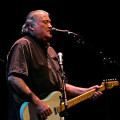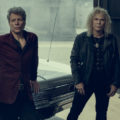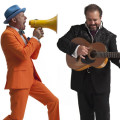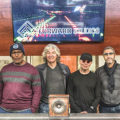Endlessly eclectic Los Lobos set to unwrap “Llego Navidad” on “Still Home For The Holidays”
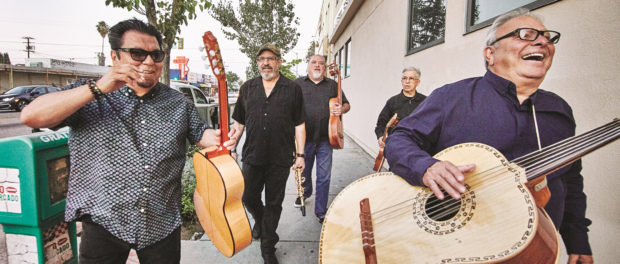 Photos provided by Piero F. Giunti
Photos provided by Piero F. Giunti
There’s never quite been a band like Los Lobos, who can just as seamlessly bounce between Latin rock, Americana, Tex-Mex, country, zydeco, blues and soundtrack compositions as it can be comfortable covering traditional Tejano/Mariachi tunes, Disney ditties or getting Elmo to dance on “Sesame Street.”
But it wasn’t until well over four decades into the unpredictability that these multiple Grammy-winners and members of Rolling Stone’s coveted “The 500 Greatest Albums Of All Time” ranking turned to Christmas tunes for their latest long player, “Llego Navidad,” which is also the subject of a “Still Home For The Holidays” livestream (coming Friday, December 11 from the Belly Up in Los Angeles).
Longtime saxophone player, keyboardist and producer Steve Berlin (who was previously in roots revivalists The Blasters), reached Chicago Concert Reviews as rehearsals were getting under way to talk all about the Yuletide trimmings, key collections such as “How Will The Wolf Survive?” and “Kiko,” along with why he, vocalist/multi-instrumentalist David Hidalgo, fellow singer/guitarist Cesar Rosas, guitarist/percussionist Louie Pérez and bassist Conrad Lozano never cared about chasing pop trends, even after the global chart-topping burst of “La Bamba.”
 Can you give us a preview of the “Still Home For The Holidays” livestream?
Can you give us a preview of the “Still Home For The Holidays” livestream?
Steve Berlin: It will be probably somewhat similar to the show we did last year when we had our first and only official Christmas release. Very sadly, obviously, we’re not going to be hanging out in Chicago like we usually are in December, so we thought this would be the next best thing. Just to make it a little more special, we reached out to some of our friends to add Christmas songs. We’re going to have contributions from Southern Avenue, Greyhounds, Clinton [Clegg] from The Commonheart, my buddy The Suitcase Junket, a band called Quetzal, who are good friends of ours here in L.A., John McCauley from Deer Tick and Making Movies. It won’t be the same as being there, but we’re going to do our best to spread as much Christmas cheer as we can. It will be featuring the Christmas stuff, but will probably be like half and half with other material.
Why did you decide to go against the typical Christmas album formula with mostly obscurities from North, Central and South America?
Berlin: Forty-five years into this, we’ve pretty much done everything else you could think of in terms of different albums and different concepts. The Christmas record was the only thing we hadn’t actually accomplished yet. Our friends at Rhino Records came to us and said they would sponsor it. We had this idea of making it kind of a Latin Christmas, but not a specific genre or a specific flavor. We just went to the church of interesting Christmas songs all over the planet really. We reached out to friends of ours who are record collectors and people who know these things intimately. I have a friend who’s a DJ in Connecticut who does Christmas DJ sets, so he had hundreds of Christmas songs in his vault that he shared with us and we just put it together. A lot of it was over our skill set. There were some really amazing Latin salsa songs that were incredible, but super complex, so we found the ones that felt the rightest for us. Everybody came up with their own ideas. It’s Christmas, so everybody’s got a memory of some song that meant something to them. That’s where it started, and then lo and behold, during the middle of July we’re making a Christmas record.
Did you put up decorations in the studio to get in the spirit?
Berlin: Christmas in L.A. is weird no matter what. We did a little bit. We strung up some lights [laughs], but it’s still L.A., so when you walk outside and its 90 degrees, it ruins the whole thing [laughs]. We did the best we can.
 Where did the one original tune, “Christmas And You,” come from?
Where did the one original tune, “Christmas And You,” come from?
Berlin: This was the [same] pattern of many of our records where we started without a really clear intention in mind. We just had a vague idea and then the record reveals itself to us as we’re making it. At the very, very end of the record, something really cool happens and something gets inspired. It’s more or less been the case on every record we’ve done for the last 20 years…There’s always something like a pearl that emerges from the process as we’re doing it. As we were working on all these Christmas songs, Louie and Dave had this idea “wouldn’t it be great to write something that sounded like a classic Christmas song?” It just came together very quickly. Generally, at that stage of the process, we’re all very deep in it creatively. “Oh yeah, it’s a great idea. Let’s do it!” Bang, boom, it’s done and that was the case on this one. I guess that’s part of our process at this point. Something new happens at the end of every project, even if it’s supposed to be a covers record.
How has Los Lobos managed to keep its core line-up so long?
Berlin: I think we all realize on some level that the thing we make when we’re together is greater than the parts. You subtract one guy or somebody’s not there, it’s never quite the same. It’s a special privilege to be part of that and it’s also a responsibility. We get mad at each other like anybody else, but at the end of the day, there’s a special conglomeration that produces this thing and we actually enjoy doing it. Bands fall apart or have issues and generally it’s because somebody feels like they’re not getting what they want out of it. They’re not allowed to express something. Certainly that’s not the case with us. Anything that anybody every wants to do is totally fine with everybody in the band. I get to produce records, Dave and Louie do the [Latin] Playboys, and Caesar does solo records. Whatever it is that you want to do, it’s always fine with everybody because everybody understands it’s a special thing when we’re all together.
What was the transitioning from The Blasters to Los Lobos?
Berlin: I was young and I didn’t have a family. The choices I made back then didn’t seem like 38-years later I’d be there. The Blasters was a ball and a great band to be part of. They gave me a musical education that I couldn’t have even imagined, like playing next to my hero [fellow saxophone player] Lee Allen and playing with [guitarist] Dave [Alvin]. Being part of that band was really special, but also when I rolled in it, I certainly got a sense of the things that were happening around me and the nature of The Blasters. As the newest guy and the youngest guy, my opinion about anything was completely unvalued…
 To get back to your question earlier, one of the things that allows Los Lobos to continue for four decades is we are a democracy. Things get voted on, but every voice is heard, and if someone has an issue with something, we hear it. There’s a lot of stuff that we’ve either done or not done because someone had an issue with it on one level or another and that’s how it works. If it’s easy, we just do it. If it’s hard, we talk about it. Sometimes you win, sometimes you lose, but in The Blasters, it was generally whoever won the fist fight was the winner and that’s a tough environment. I’m not a fighter, so for me it just felt like nothing I had to say was ever heard. It wasn’t like I was gonna leave no matter what. When I started working with Lobos, even when I wasn’t in the band, they would listen to what I had to say. That was really refreshing to say the least, so that made that choice much easier to know that if I had an opinion about something, that would be listened to and respected. That’s what made the choice to join Lobos and leave The Blasters much easier. It really wasn’t a very momentous decision when it happened at all.
To get back to your question earlier, one of the things that allows Los Lobos to continue for four decades is we are a democracy. Things get voted on, but every voice is heard, and if someone has an issue with something, we hear it. There’s a lot of stuff that we’ve either done or not done because someone had an issue with it on one level or another and that’s how it works. If it’s easy, we just do it. If it’s hard, we talk about it. Sometimes you win, sometimes you lose, but in The Blasters, it was generally whoever won the fist fight was the winner and that’s a tough environment. I’m not a fighter, so for me it just felt like nothing I had to say was ever heard. It wasn’t like I was gonna leave no matter what. When I started working with Lobos, even when I wasn’t in the band, they would listen to what I had to say. That was really refreshing to say the least, so that made that choice much easier to know that if I had an opinion about something, that would be listened to and respected. That’s what made the choice to join Lobos and leave The Blasters much easier. It really wasn’t a very momentous decision when it happened at all.
Why do you think Los Lobos’ full-length label debut, “How Will The Wolf Survive?,” made such a splash?
Berlin: “How Will The Wolf Survive?” was the first record I was a part of as a full band member and I produced it with T Bone Burnett. Lobos let me scratch that itch, which they didn’t really have to. There’s no reason why anybody would’ve hired me as a producer. I hardly ever produced anything, but I know I wanted to do it and they were very gracious in letting me do it. The guys had written songs at that point and I thought they were really good, but the writing really took a giant leap. Specifically, “Will The Wolf Survive?” represented a momentous change to me. We went from writing songs in very identifiable styles, like a zydeco song, or blues, or whatever, but that was the first song to me that synthesized everything that we could do…That’s when I realized the songwriting was of a real brand that was gonna stick around awhile. It wasn’t just us trying to write our version of a Howlin’ Wolf song. We had a very specific thing that we wanted to say and that was the first time we got to express it.
How do you view the enormous response to “La Bamba” and its effect on the band?
Berlin: When we were working on it, the idea that somehow or another it was gonna be a hit record was literally the furthest possible thing from our mind. It was a first-time movie director, a bunch of actors that had only ever done regional theatre in San Juan Batista, which is like the middle of absolutely nowhere California, telling the story of a guy [Ritchie Valens] who wrote 18 songs and died in a plane crash. I’m obviously making light of it, but there was very little going into it that made it seem like this was gonna change anybody’s life. I was producing the soundtrack and working very closely with the director [Luis Valdez]. As I was doing that, I saw lots of different versions of the movie as it was coming together. There was a much longer version of the movie just prior to the one that came out, but it had like a 20-minute dream sequence that really killed the momentum of the movie. Ritchie goes to Mexico, takes peyote and has this dream. It was just stupid beyond belief, but we scored it with Carlos Santana and it was this whole big production. I guess it tested poorly, so they cut that whole story out.
 Then I remember seeing what became the release version just before we went to Europe. Up until that point, I didn’t think it was a very good movie to be honest, nor did anybody else. And I remember thinking “wow, it’s actually a pretty good movie. It’s a shame that nobody’s gonna see it.” That was my last thought before the movie came out. At that point, there wasn’t even cable, [so I thought] it was gonna go right to the bargain bin. Then we go to Europe for the better part of two months, and this is before cell phones, so we were still doing telegrams, believe it or not. Overseas calls cost a zillion dollars, so we weren’t calling home every day. The movie comes out and it’s become a big hit [in America, but] it’s not a hit in Europe yet. So we’re getting these weird messages from our manager at the time. “The movie’s a hit! The song is top 40! It’s in the top 15!” All the s*** is happening and we’re not in America, so none of it’s real to us. Frankly, I don’t think any of us believed it. Then we come home, and sure enough, it’s all true! Even as it was happening, it was still like “Can you believe this? Is this really happening?” But it did. The whole thing was fun. We got to see what life was like at the top of the musical food chain and it was great, but when it was over, it was not sad.
Then I remember seeing what became the release version just before we went to Europe. Up until that point, I didn’t think it was a very good movie to be honest, nor did anybody else. And I remember thinking “wow, it’s actually a pretty good movie. It’s a shame that nobody’s gonna see it.” That was my last thought before the movie came out. At that point, there wasn’t even cable, [so I thought] it was gonna go right to the bargain bin. Then we go to Europe for the better part of two months, and this is before cell phones, so we were still doing telegrams, believe it or not. Overseas calls cost a zillion dollars, so we weren’t calling home every day. The movie comes out and it’s become a big hit [in America, but] it’s not a hit in Europe yet. So we’re getting these weird messages from our manager at the time. “The movie’s a hit! The song is top 40! It’s in the top 15!” All the s*** is happening and we’re not in America, so none of it’s real to us. Frankly, I don’t think any of us believed it. Then we come home, and sure enough, it’s all true! Even as it was happening, it was still like “Can you believe this? Is this really happening?” But it did. The whole thing was fun. We got to see what life was like at the top of the musical food chain and it was great, but when it was over, it was not sad.
What made you follow-up with a traditional project, “La Pistola y El Corazón,” rather than chasing continued pop stardom?
Berlin: We knew there was no future in chasing it. It was a one-time, magical bean that somebody gave us. It gave us success, but it was not something we could plant and grow. It was all about the movie, and having a summer hit, and summer songs very rarely turn into real careers. It was that special moment where people are on vacation, it’s summertime, there’s a soundtrack and everybody wants that soundtrack, but as soon as fall hits, that song doesn’t resonate on the same frequency while everybody was carefree. We realized that, and we also realized to hold down a real career, we had to effectively separate ourselves a bit from what people might have thought we were, as represented by “La Bamba.” The first record the band put out before I joined, [the self-released “Los Lobos del Este de Los Angeles”], was folkloric music and we wanted to do that again. The feeling was if there was ever a time to do it, it was right then when we had a little bit of the world’s attention and it gave us a bit of a breathing space. We weren’t trying to make “La Bamba” two or trying to make it seem like we were cashing in on our surprising success.
 Lightning struck again when it came to critical acclaim for the “Kiko” collection. What’s your take?
Lightning struck again when it came to critical acclaim for the “Kiko” collection. What’s your take?
Berlin: So that I guess there was a dark part of the story. After “La Bamba,” we did “La Pistola y El Corazón,” then we did “The Neighborhood.” We thought we were a bigger deal then the world did. We spent a really long time making “The Neighborhood,” which is not what we usually do. Then we toured on a scale that wasn’t merited by [our popularity]. We had lights, and two buses, and we ended up not just losing a lot of money, but the making of “The Neighborhood” just took forever. We ended up redoing, and redoing, and redoing a bunch of songs for some stupid reason I can’t recall. By the end of that whole cycle, we were really frustrated, flat broke and we felt like we had fooled ourselves.
“La Bamba” was such a wonderful, great time. We were making money, we were playing stadiums, although we were opening for U2 of course, but it was a big deal. Then we had this very disappointing experience on every level, not just artistically, but personally and financially. We started thinking about what the next record was going to be, and to be perfectly honest, we just said “f*** it. Let’s just make the record we want to make. We’ll write the songs we wanna write, play ‘em the way we want to play ‘em and we’re not gonna listen to anybody.” I take full responsibility for listening to bad advice. I think all of us do. We were very poorly advised back in that era. We just decided we were gonna stop listening to anybody but ourselves and that’s where “Kiko” came from.
Which latter era projects are your favorites and why?
Berlin: That whole cycle of “Kiko,” “Colossal Head” and “This Time.” Those are three records we made with [producer] Mitchell Froom and [producer/engineer] Tchad Blake. I look at those three as sort of one thing. The same team, making those records in the same studios. We resonated with each other on a pretty profound level and I think the artistic output was really high. I would say that “The Ride,” the record that we made for the 30th anniversary, was a lot of fun. We reached out to a lot of our heroes and almost everybody said “yes,” [including Mavis Staples, Elvis Costello and Tom Waits], so that was special.
 I really like the last few. The Christmas record was pretty great and “Gates Of Gold.” I’m proud of all the records. We get to make them exactly as we want to make them. It’s been so long since anybody’s asked us to do or not do something, so we have to stand behind them and I do. Albums are a lot of hard work, although, of course, we are musicians. We don’t have to lift anything to make them [laughs]. We’ve been at it for a long time and we’re really lucky. We would not be where we are without Chicago, and WXRT, and all of our friends, there’s no doubt.
I really like the last few. The Christmas record was pretty great and “Gates Of Gold.” I’m proud of all the records. We get to make them exactly as we want to make them. It’s been so long since anybody’s asked us to do or not do something, so we have to stand behind them and I do. Albums are a lot of hard work, although, of course, we are musicians. We don’t have to lift anything to make them [laughs]. We’ve been at it for a long time and we’re really lucky. We would not be where we are without Chicago, and WXRT, and all of our friends, there’s no doubt.
How would you describe Los Lobos’ relationship with Chicago? Any concerts come to mind?
Berlin: Oh man, there’s so many, that’s really hard. Opening day for the Cubs a couple of years ago was pretty cool. It’s funny, you’d think the bigger shows would be the ones I remember, but it’s usually the smaller ones, like playing Biddy Mulligans, whenever that was. Those are the ones that stick in my mind. I don’t remember any shows that weren’t wonderful. The City Winery shows all kind of run together. As great as they are, it just seems like a blur. In many ways, Chicago’s more “home” than home [laughs]. When we play in L.A., it’s a big deal of course, but it’s always a little hard. Everybody’s families are there. No one’s allowed to just be in the moment, and just play, and do the thing we’re supposed to do, which is have fun making music. Usually somebody’s got some cousin that can’t get in or the babysitter didn’t show up. Obviously, we have real lives too. Playing in L.A. is very rarely fun. “Oh, thank God we got through it and nobody’s in jail.” Chicago, on the other hand, is always fun. It’s just a party. It’s much more like what you’d expect a homecoming show to be like then any of the homecoming shows that we actually do. It’s just a ball.
For additional information on Los Lobos, visit LosLobos.org.

